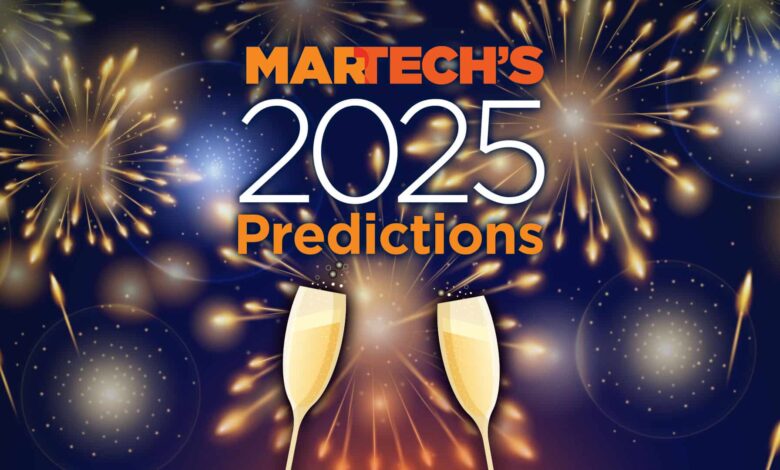Social media and influencers: 2025 forecasts

Social media platforms are portals to deep and meaningful engagement with customers. It’s also the place where content creators and influencers cultivate passionate fan bases. For marketers looking to meet their customers where they are, social media cannot be overlooked.
Here are some predictions on where brands can find opportunities and innovation in 2025 to gain an edge in a rapidly evolving space.
We don’t know what form TikTok will take in the United States, because the date of a probable ban is approaching. We know that no matter what platform customers turn to, they will have things to say about brands and retailers. This creates an opportunity for marketers to boost customer service on social media in the new year.
“Social media will dominate the customer service game,” said Scott Morris, chief marketing officer of Sprout Social.
Morris highlighted that Sprout Social’s Q4 2024 Pulse survey found that about a third (35%) of consumers plan to use social media more to get answers to customer service questions. “And this is even more pronounced among younger generations like Gen Z (49%) and Millennials (41%),” he said.
“With almost everyone turning first to platforms like Facebook and Instagram for quick answers to their questions, expectations for speed and personalization have never been higher,” Morris explained. “In fact, among all social media users, 40% want businesses to prioritize personalized customer service on social media in 2025.”
AI automates (some) customer problems
Marketers looking to keep customers happy will be proactive in addressing service issues on social media. AI will play a key role in providing answers to frequently asked questions, while a human touch will be needed for more specialized requests.
“AI must be dispersed to manage workflow and automated tasks, leaving social and care teams to focus on creative content and meaningful customer engagement,” Morris said.
Morris added: “Social media marketing in 2025 should focus on creating immersive, personalized and seamless experiences. With this influx of buyers, AI-powered customer service will play a vital role. Brands also need to make their products more visible on social media, whether through user-generated content or expanded influencer campaigns. Brands that adapt their strategies in this way will meet consumer expectations and stay one step ahead.
Comprehensive Influencer Strategies
Influencers are an effective way to introduce new products to their fans. Beyond growing awareness at the top of the funnel, influencer content can reach audiences ready to buy. And deep knowledge of social media platform users can help drive these bottom-of-funnel results. As a result, more brands will launch full-funnel strategies through influencers in the coming year.
“As consumer interests become increasingly specialized, marketers recognize the need to more precisely target their influencer strategies in order to deliver attributable results,” said Sean O’Brien, CTO and co-founder from the Mavely influence platform. “In the past, the industry focused primarily on awareness and high-funnel metrics like engagement and likes. Today, technologies like AI and app-to-app deep linking enable marketers to improve the buyer experience and provide more comprehensive metrics that drive campaigns seamlessly, from post-creation upon purchase.
“Brands will increasingly use creator-generated content to seamlessly guide audiences from trust stories at the top to conversion-focused recommendations at the bottom,” said Joseph Perello, CEO of the platform. Marketing for Creators Props. “This strategic alignment will condense the customer journey and drive efficiency, making creator marketing an essential tool for achieving measurable business results at every stage.”
Dig Deeper: Meta announces genAI video tools and closer partnerships with creators
Marketers Find Better Segmentation and More Authentic Connections on Bluesky
The growing awareness of the Bluesky social platform as an alternative to X will lead to greater brand involvement in 2025.
“Bluesky will stand out for two main reasons: its focus on decentralization and its ability to empower both users and brands,” said Isabel Romero, marketing director of social media management tool Metricool.
“For users, Bluesky will be the space where algorithms don’t dictate what they see,” Romero said. “Rather, it is a transparent network that prioritizes individual experience. This approach will bring fresh air into an ecosystem cluttered with centralized platforms.
Romero added: “For marketers, this means greater control over data, innovative ways to segment audiences and, above all, a more authentic and direct relationship with users. »
B2B marketers step up short-form social sharing
“As traditional social media strategies become oversaturated, brands will shift to audiences outside of their own channels,” said Daniel Kushner, CEO and co-founder of social media marketing platform Oktopost . “In 2025, successful B2B companies will integrate into the comment sections of influencers and thought leaders to spark conversations and gain visibility with highly relevant niche audiences. »
Kushner added: “With 90% of B2B buyers preferring video for learning and 85% of marketers finding it very effective for engagement, platforms like TikTok, Instagram Reels and LinkedIn will see an increase in small videos providing concise advice on the industry. updates and information. In 2025, B2B marketing teams should prioritize short-form storytelling by creating snackable, high-impact visuals that entice viewers to explore longer resources like webinars or white papers.
“We’re already seeing AI capabilities being integrated into the marketing technology stack,” said Natalie Silverstein, director of innovation at influencer marketing company Collectively. “I expect to see major improvements and even see entirely new leapfrog startups emerge. The pace of innovation is poised to accelerate dramatically.



